Parents are the guiding force in their children’s lives and children grow up emulating and idolizing their parents. For every child, their parents are the people to look to when it comes to understanding how life is and what it means to be a healthy and good person. However, this doesn’t hold true for emotionally immature parents.
Emotionally immature parents are controlling, narrow-minded, unreliable, and demanding. They tend to shame and guilt their kids into doing what they want them to do and have zero consideration about what their kids might want. Your emotional needs were never met by your parents, and even as a child, you felt lonely and depressed. You could never have a healthy, normal, and happy relationship with them, and all you craved was love and some parental affection.
Adult children of emotionally immature people never knew what parental affection is, and never got to experience any sort of emotional intimacy from them. Even after growing up, your disturbed and unhappy childhood keeps on haunting you and your emotional wounds always prevent you from being happy.
Related: How Emotionally Immature Parents Have a Lasting Effect In A Child’s Adult Life
Who Is An Emotionally Immature Parent?
What does being immature mean? Immature means when you don’t fully grow the way you are supposed to, be it physically, emotionally, mentally, or psychologically even. Emotionally immature parents have no idea how to regulate their emotions, and this leads to them behaving in ways that end up harming their children in some way or the other.
They might have gone through a fair share of trauma in their childhood, and haven’t been able to deal with it in a healthy way. Because they haven’t processed their pain, they knowingly or unknowingly inflict that same pain on their children, unaware of the damage they are causing.
Some of the causes behind their emotional immaturity are the following:
- Unresolved childhood trauma
- Emotional neglect in childhood
- Dysfunctional upbringing
- Narcissistic Personality Disorder (NPD)
- Unresolved psychological issues and differences
- Untreated addiction
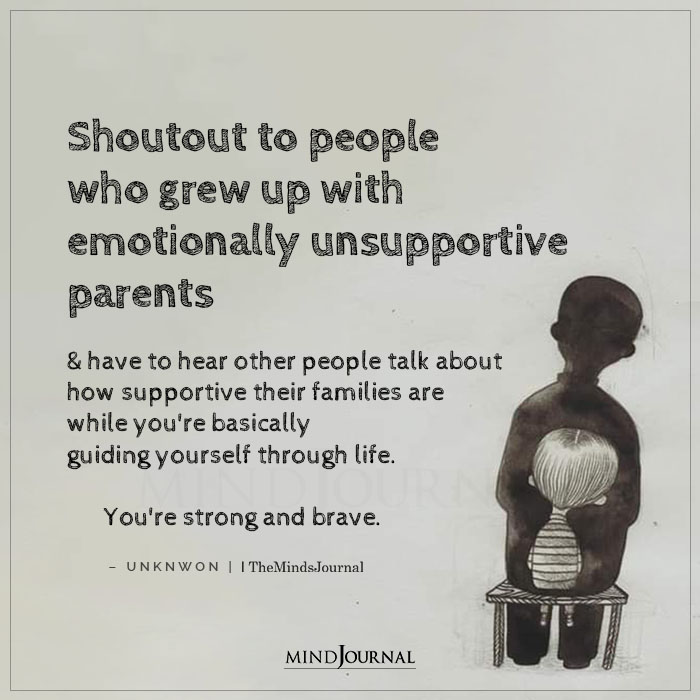
4 Types Of Emotionally Immature Parents
1. Driven Parents
On the outside, driven parents look like normal parents who are highly interested and invested in their children’s lives and activities. And they honestly are. But the catch is, that they are extremely controlling and interfering, and give absolutely no sort of space to their children to do their own thing.
They are goal-oriented and reward-oriented people, who only care about winning and achievements. They only care that their children succeed and achieve great things in life. However, they show almost no empathy and emotion at all. There’s an absolute lack of emotional connection, support, and intimacy from their side.
Related: 60+ Quotes About Selfish Parents That’ll Help You Cope Better
2. Rejecting Parents
Rejecting parents are generally quite dominating and controlling and rule their family with an iron fist. Everyone is scared of them and tries very hard not to upset them in any way. They don’t have any sort of closeness and connection with their children, and apart from issuing commands, abusing, shouting, and screaming, they pretty much like to be left alone.
If you try to initiate any sort of closeness and emotional intimacy with them, they get extremely uncomfortable and angry and choose to leave the situation. In short, they reject all sorts of intimacy and connection from their children.
3. Emotional Parents
Emotional parents are extreme in every sense, and there is no middle ground for them. The smallest setbacks and issues tend to drive them over the edge and they behave as if it’s the end of the world for them. Parents like them are either unhealthily involved in their child’s lives, or they are extremely distant.
Whenever they are ticked off by something, they look towards external factors to make them feel better, like maybe getting really drunk or relying on other people to soothe them. They are never able to regulate and handle their emotions on their own.
4. Passive Parents
Passive parents try their best to stay away from upsetting and negative situations, and never really try to do anything constructive. They are mostly regarded as the “favourite parent” or the “good cop”, since they never try to stop their kids from doing anything. They dislike being the disciplinarian and prefer to take a backseat when it comes to the hard parts of parenting.
A passive parent doesn’t guide or educate their children about how to navigate the world and its complexities. Moreover, they also choose to ignore the horrible things their children are subjected to by the other parent, like corporal punishment, abuse, and neglect. They don’t have any sort of confidence and even interest in wanting to raise their children in a normal and healthy way.
Related: 6 Traits of Emotionally Immature People
7 Signs You Were Raised By Emotionally Immature Parents
1. They are extremely self-centered.
Emotionally immature parents only care about themselves, and least of all their children. However, they are convinced that they are the best parents for their children, and there’s absolutely nothing wrong with them. Parents like them tend to impose their opinions, decisions, and choices on their children, even if it makes them extremely unhappy.
In their heads, they think that whatever they’re doing it’s for the best of their kids and don’t care whether their kids are happy about it or not. They live in a delusional bubble that they’re the best parents in this world, and they can never do any wrong.
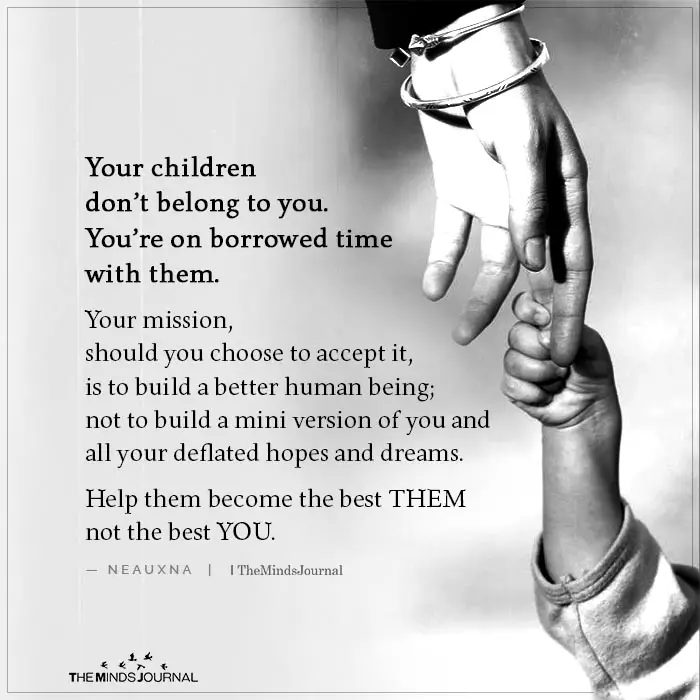
2. They are never emotionally vulnerable to you.
Parents who are emotionally immature tend to feel very uncomfortable with showing their emotions to their children. They feel that if they’re vulnerable with their kids, it will undermine and cancel out their parental authority, which is why they always maintain emotional distance from them.
Vulnerability, emotional connection, and emotional vulnerability are all alien concepts for them. However, when it comes to being strict, overly controlling, imposing their decisions and opinions, and issuing commands, they show no hesitation. Expecting emotional intimacy from them will always be wishful thinking.
3. They are inflexible and rigid-minded.
One of the major signs of emotionally immature parents is this. There’s no way in hell, they will listen or even try to understand your feelings. They live in a world of their own, where they are always right and fair; with emotionally immature parents, it’s always “My way or the highway”.
They just cannot fathom that you might think differently from them, and have different opinions, dreams, and choices in life. They are always so stuck in their heads that they forget that the world doesn’t revolve around them and their wishes.
Related: 6 Common Ways Parents Confuse Kids By Their Hypocritical Behavior
4. They have zero respect for your boundaries and choices.
Emotionally immature parents don’t understand the concept of personal boundaries and personal choices. They are experts at violating their children’s boundaries by constantly imposing their choices on them and completely disregarding what they want and wish for.
They never respect your privacy, and if you tell them that you need some space they take it very personally and behave as if the world has crashed on their heads. A sense of entitlement and superiority complex makes them so controlling that they are happy only when you let them disrupt your life, impose their decisions on you and let them do whatever they want without any issues.
5. They are people ruled completely by their egos.
For parents like them, everything they do, say, and believe is decided by their egos. They can be so egoistic, that it’s almost impossible to even have a normal and civil conversation with them. They are entitled, narcissistic, aggressive, and self-absorbed and don’t care about how much they might be hurting their kids.
On the other hand, they can also be experts at playing the victim and being passive-aggressive, when they see that you are not giving them the importance and attention they’re craving. As long as you do what they say, everything’s good, but the moment you go against them and their wishes, their egoistic side comes out.
6. They are experts when it comes to using toxic defense mechanisms.
This is one of the most crucial things you need to know and understand when it comes to the emotionally immature parents checklist.
Because they are incapable of understanding their flaws and mistakes, they choose to resort to toxic defense mechanisms in order to save face. By the way, they do this, even when they know they are wrong. They are scared of someone bursting their bubble, which is why they can go to any lengths to make sure that doesn’t happen.
They resort to straight-out denial, where they refuse to take responsibility for their mistakes, no matter how outrageous and heartbreaking they might be. They also resort to projection where they blame you for their mistakes and insecurities and gaslight you till you believe their lies and manipulation.
Related: 12 Signs You Have A Toxic Parent and How To Deal With It
7. They hold you responsible for their happiness, sadness, and everything else.
Emotionally immature parents base their emotional stability on their children, which is why they will always hold you responsible for all their emotions and moods. Additionally, their emotional state depends on you and how you are feeling. If you don’t do what they want you to do, they will quickly spiral towards depression and immense unhappiness, and they will blame you for hurting them and breaking their heart.
Even though they are your parents, most of the time, it seems like you are the one doing the parenting. Because they are so self-obsessed, they always put their own feelings and emotions first, even at the cost of yours.

How To Deal With Emotionally Immature Parents
1. Learn to prioritize yourself and your needs without feeling guilty.
This is probably the most important and best thing you can do when it comes to healing from emotionally immature parents. You will be shamed and made to feel guilty when you choose yourself and your happiness, but that is what you need to do if you want to save your sanity.
Prioritize your happiness and mental peace, because that’s the only way you have any hope of maintaining your sanity. Make self-love, and self-care your best friends, and don’t compromise with them at any cost.
2. Take charge of every conversation and interaction you have with them.
Even though emotionally immature parents can be very manipulative and controlling, you have to try and take charge of every conversation you have with them. Immature people are normally not very knowledgable or intelligent and this is what you need to remember so that you can lead your interactions with them.
Navigate through the conversations wisely by not reacting to their inflammatory comments, ignore them when they try to emotionally blackmail and manipulate you, and try to steer the conversation towards topics of your interest. Direct the conversation without being passive and scared.
Related: 10 Signs You Are Dealing With A Childish Adult
3. Practice emotional detachment.
This one might be the toughest thing you will have to do. Detaching yourself emotionally whenever your parents try to rile you up, or ignore your feelings can be hard, but necessary. Emotional detachment can protect you from so much pain inflicted by your parent, and it will stop you from being their emotional victim.
The more you realize and understand their toxicity and games, the better you get at training yourself in the art of emotional detachment. Emotionally immature parents will have no power over you if you stop letting them control and manipulate your emotions.
Children of emotionally immature parents suffer a lot, it’s just that most of it iis mental, emotional, and psychological. When parents are not mature enough to understand and parent their children, then naturally, it extracts a heavy toll on the latter. If you are someone who has emotionally immature parents, then I hope this article was able to help you understand how they think and what you can do to handle them.
Let us know your thoughts and opinions in the comments down below!
Want to know more about emotionally immature parents? Check this video out below!
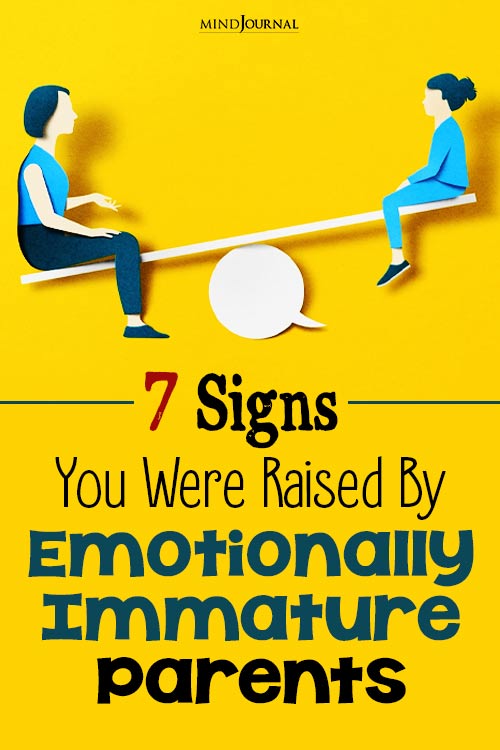
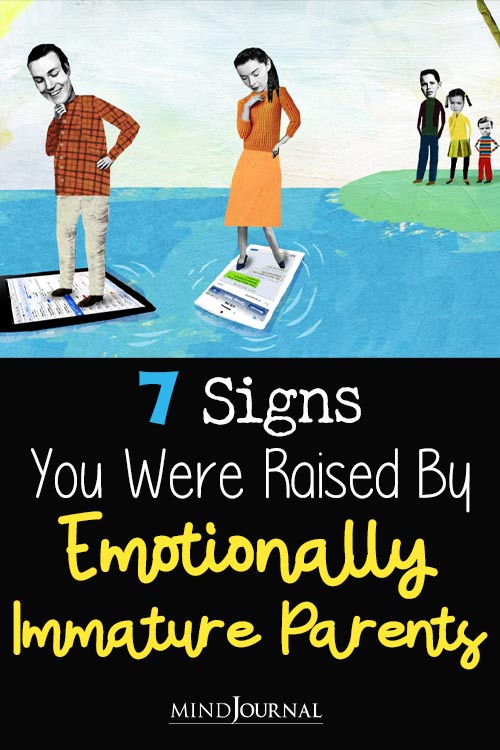
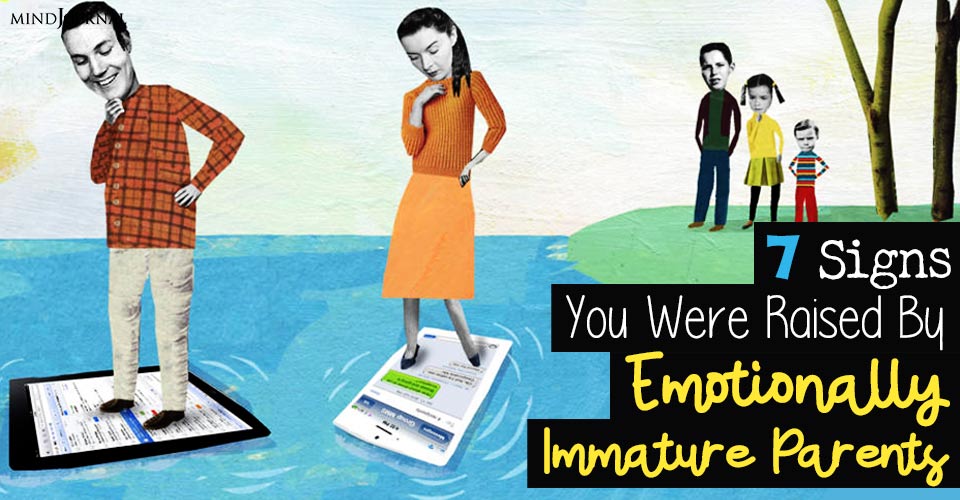







Leave a Reply
You must be logged in to post a comment.